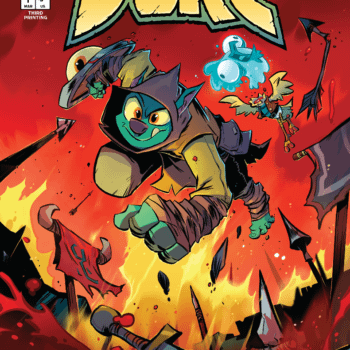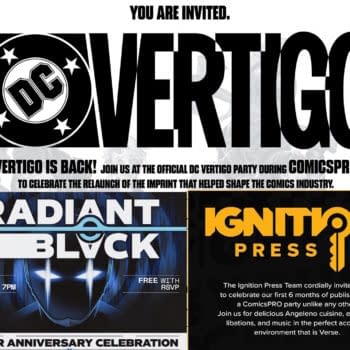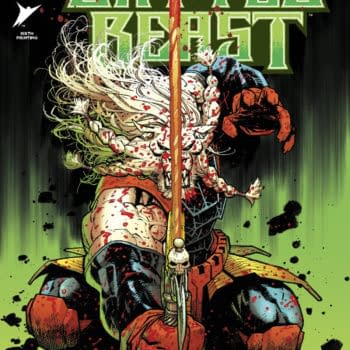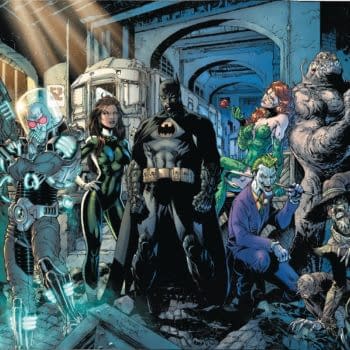Posted in: Comics | Tagged: batton lash, Comics, supernatural law
Beware The Creatures Of The Night – They Have Lawyers!
Batton Lash writes for Bleeding Cool,
I am a cartoonist and creator of a long running series called Supernatural Law.
Supernatural Law features a pair of attorneys who have a practice called Wolff & Byrd, Counselors of the Macabre. Alanna Wolff and her partner Jeff Byrd (aided by their intrepid secretary Mavis) represent vampires, werewolves and things that go bump in the night (hey, somebody has to defend them!). I have been writing and drawing stories about Wolff & Byrd for 35 years and I've used whatever medium was available to me to do the comic.
In 1979, I had an opportunity to do Supernatural Law (then titled Wolff & Byrd, Counselors of the Macabre) as a comic strip for weekly newspapers (the strip appeared in such diverse weeklies as The National Law Journal and Comics Buyers Guide). Newspapers were a great training ground for me to tell stories to a non comics-cognoscenti audience (tell the story clearly! And no in-jokes!). The weekly deadline demanded a strip every week, rain or shine. In 1994, the direct market for comic book stores offered a chance for me to turn Supernatural Law into a periodical (a "floppie") and stretch my storytelling chops with more complex plotting and expanding on the back-stories of Wolff & Byrd and Mavis.
But times change. For a lot of self-publishers, a 32 page, black & white comic book is not economically feasible anymore. But trade paperbacks thrive. Square-bound books have a longer shelf life in comic book stores and bookstores. Furthermore, trades are attractive to libraries, which have become an important market for comics.
Like other independent cartoonists, once I had several issues done, those stories would be collected in a trade paperback. But with the Supernatural Law periodical gone, were does the content come from? Online, of course!
Webcomics have proved to be a boon for cartoonists and the comics medium. Unburdened by printing costs and having access to a global audience, it has become a whole new ball game for the self-publisher.
Supernatural Law made the digital move in 2005 while the
"floppie" version was still being published. I had hoped that I could re-use the digital material for the periodical, but by 2008, there was a decline in comics stores and a general belt-tightening among retailers (not to mention additional hardship as a result of the USA economy tanking), the handwriting was on the wall for Wolff & Byrd's comic book. I was heartened that I was getting new readers of Supernatural Law via the webcomic and there was still interest to see the series in print. That was good to hear because as much as I enjoy producing the comic digitally, I'm still a print guy at heart! Fortunately, I can have the best of both worlds.
I see the new economics for the comics business analogous to music radio of the 60's and 70's. A listener would hear a song for free on the radio. More often than not, the listener liked what was heard and he or she would go to the local record store and buy the album. A similar thing is happening with comics. Many digital comics (such as Supernatural Law) are offered for free, but there are still many readers will read a favorite comic online, but still want a printed version, in a nicely designed volume that they could put on their shelves.
Sounds like win-win to me. And digital comics offered something most indies couldn't afford in print: color! The solution for me was doing a regular webcomic, then collect the material and go the trade paperback/graphic novel route. But trade paperbacks– especially ones in full color– remain an expensive proposition.
Enter Kickstarter. I was impressed by the crowdfunding of a wide scope of creative endeavors that included comics. Crowdfunding allows fans to be engaged in the production of a work. Often times (too often!) an editor, publisher, or executive would nix a project, sometimes due to cold feet or, in most cases, they just don't get it. The fans, however, get it. And they are willing to support a project and help the creator bring it to fruition. Actually, it's very much a time-honored practice that dates back to the Middle Ages when artists would have their work funded by "patrons of the arts." Everything old is new again!
I'm using Kickstarter to raise funds in order to publish a full color collection of my webcomic strips called Zombie Wife and Other Tales of Supernatural Law. I've had two previous Supernatural Law books published (2012's Monsters Meet on Court Street and 2013's The Werewolf of New York, my first in full color) thanks to crowd funding. To say that Kickstarter and digital comics is a boon for the independent and self-publisher is an understatement.
In 35 years, the publishing landscape has changed quite a bit. I love working on Supernatural Law and am very fortunate that there is always a new audience discovering it. I can't think of a time when cartoonists had more freedom as well as options in financing and distributing their work. It's a very exciting time to be creating comics.














